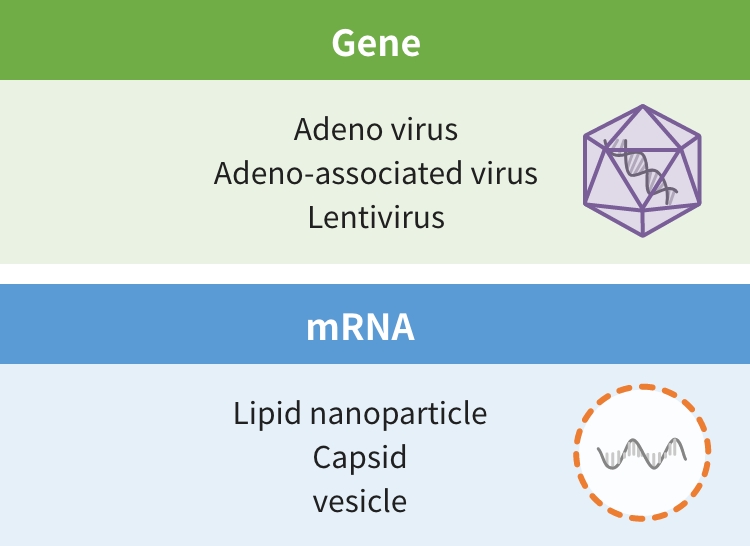We strive to discover and develop gene therapy drugs based on our PPR Platform Technology, mainly in CNS, muscular, and rare diseases.
We believe our RNA targeting approaches will achieve safer and more innovative therapies to reverse genomic DNA damage and restore normal gene function.
We are committed to leveraging our innovative PPR Platform to discover and deliver breakthrough therapies to patients suffering from diseases worldwide.
Targetable RNA-related diseases
PPR platform technology enables various RNA controls, including RNA editing, translation enhancement, splicing control, and RNA blocking, and allows targeting a wide range of RNA-related diseases.
Mechanism of action
RNA editing
Target disease
・Diseases caused by point mutations (C>T, T>C mutations) in RNA
・Mitochondrial disease
Translation enhancement
Target disease
・Disease not amenable to gene replacement therapy with AAV due to the large gene size
・Haploinsufficiency Diseases
Splicing control
Target disease
・Diseases in which the splicing pattern is abnormal due to mutation
RNA blocking
Target disease
・Diseases caused by abnormal RNA that traps a specific RNA-binding protein.
・Repeat RNA disease
・Myotonic dystrophy type 1 (DM1)
PPR is Amenable to Multiple Delivery Systems
We are developing our PPR platform to be delivered by viral vectors such as an adeno-associated virus (AAV). However, other delivery approaches are in development better suited to different disease settings.


Pipeline

Lead Program
EF-210
Indication : Myotonic Dystrophy Type 1 (DM1)
DM1 is a multisystem disorder effecting skeletal muscle, eye, heart, CNS, endocrine systems, and the most prevalent triplet repeat disease. The cause of DM1 is estimated to be the expansion of a CTG repeat in the noncoding region of DMPK.
1 in 8,000 ~ 20,000 people are afflicted with DM1 worldwide, with estimated 15,000 patients in Japan and 150,000 in Japan, US, and Europe combined. Patients with DM1 suffer from severe symptoms. Unfortunately, there are currently no FDA-approved treatment options for DM1.
Approach
EF-210 is a recombinant AAV that delivers a therapeutic molecule into patients’ muscles. The therapeutic molecule CUG-PPR1 specifically binds to pathogenic RNA and releases splicing factors, restoring normal splicing activity and muscle function.
We are striving in the development of EF-210 with the hope that our platform technology can provide breakthrough treatments for diseases that have no fundamental treatment.
